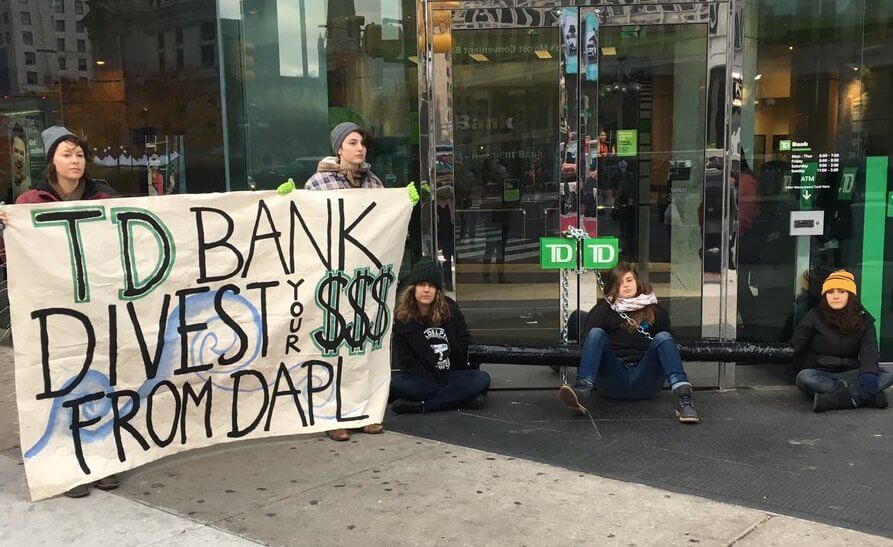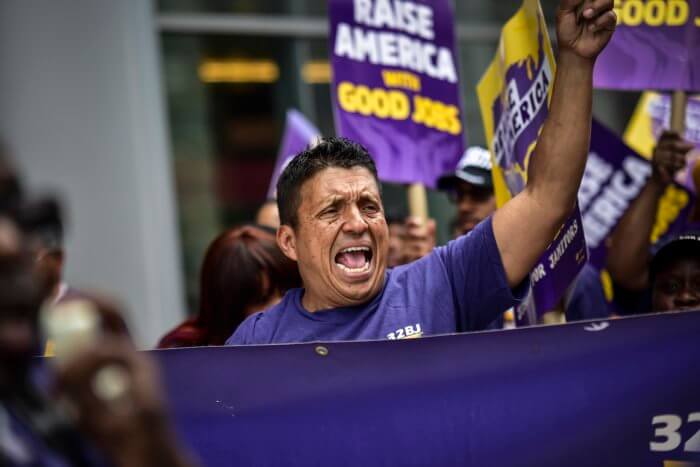Police took six women into custody on Monday outside a Center City bank during a protest against the controversial Dakota Access Pipeline.
Three protesters chained themselves to a front door to the TD Bank at 15th Street and JFK Boulevard at about 8 a.m. to prevent it from opening.
Militarized police used water canons on peaceful #WaterProtectors Stop violating indigenous rights #DivestDAPL pic.twitter.com/hzwNdcFM8v
— Eva Resnick-day (@eresnickday) November 21, 2016
TD Bank shutdown by women responding to a call for solidarity with indigenous #WaterProtectors #DivestFromDAPL pic.twitter.com/Ed4d17Xppr
— Eva Resnick-day (@eresnickday) November 21, 2016
“TD divest now!” the women chanted. “Shut this pipeline down!”
The protesters were handcuffed together using a PVC pipe in what activists call the “sleeping dragon.”
Police arrived on the scene within about 23 minutes and used power tools to cut open the PVC pipe and separate the protesters. A police spokeswoman said that six protesters were involved, but only four were detained and issued civil citations for disorderly conduct and unlawful assembly. The protesters targeted TD Bank because it is one of more than a dozen banks providing financing to complete the $3.8 billion, 1,172-mile pipeline project. The portion of the pipeline that would traverse Standing Rock Sioux Tribal land has sparked protests in North Dakota since April. Opponents, including Food and Water Watch, which helped organize the TD Bank protest in Center City, say the pipeline project should be discontinued. In a news release, the group said it “poses a significant threat to the water supply of the Standing Rock Sioux and millions of other people downstream, and would desecratesacred burial grounds, religious, and other historical sites.” Protesters want TD Bank to follow the lead of Norwegian bank DNB, which recently sold off its assets in the disputed pipeline project.
“I am putting my body on the line in solidarity with the water protectors at Standing Rock,” Jessica Rohan, one of the women who chained herself to the bank doors, said in the news release, which was sent out by the environmental group, Three Rivers Rising Tide. “In the past 24 hours, the non-violent actions of water protectors have been met with tear gas, concussion grenades, and water cannons. We’re here to tell TD Bank that destroying indigenous land and poisoning the water of thousands of people is bad for business,” the group said. Another participant in the protest, Abigail Meinen, echoed those sentiments.
“Indigenous women have led the fight against this pipeline from the beginning,” Meinen said. “Today, as a group of women, we have come together in solidarity with our Indigenous sisters, mothers, and elders, and say that we will fight with you.” TD Bank released a statement saying they respect the protesters’ right to demonstrate.
Anti-pipeline protests have taken place around the nation, with participants calling themselves “water protectors.” The protesters claim they have been targeted by law enforcement who have used tactics that include assigning police officers in riot gear with police dogs, to deploying water cannons and acoustic weapons, Tasers and concussion grenades. Opponents claim the pipeline would violate an 1851 treaty with the Sioux.
































